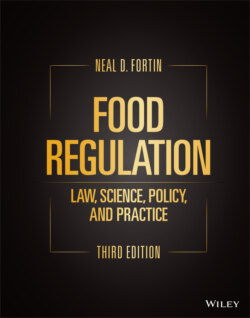Читать книгу Food Regulation - Neal D. Fortin - Страница 300
5.8 MEDICAL FOODS
ОглавлениеA medical food is “a food formulated to be consumed or administered under the supervision of a physician and which is intended for the specific dietary management of a disease or condition for which distinctive nutritional requirements, based on recognized scientific principles, are established by medical evaluation.”65 Medical foods are exempt from disease statement limitations and from the NLEA health claims requirements as long as they identify the diseased population for whom they are designed.66 Medical foods are also exempt from the NLEA labeling requirements for nutrient content claims.67
However, medical food is a narrow and special category. Medical food claims must be based on therapeutic or chronic medical needs. For instance, foods for those with genetic metabolic disorders. A medical food must be intended for a patient who has a limited or impaired capacity to ingest, digest, absorb, or metabolize ordinary foodstuffs or certain nutrients, or who has other special medically determined nutrient requirements.
While some diseases benefit from the consumption of certain types of foods, if those foods are available as part of a healthy diet and the nutrients within those foods are able to be absorbed by the patient, then the foods would not be considered medical foods. Rather, medical foods are foods that are specially formulated and processed for a patient who requires use of the product as a major component of a disease or condition’s specific dietary management. For example, vitamin C to cure or prevent the scurvy is not a medical food because the disease can be cured or prevented with a healthy diet. On the other hand, a food that eliminates or significantly restricts phenylalanine for treatment of phenylketonuria could be considered a medical food.
